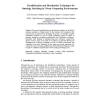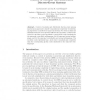2110 search results - page 29 / 422 » What is the complexity of a distributed computing system |
WSC
2007
13 years 10 months ago
2007
Co-design modeling is considered key toward handling the complexity and scale of network systems. The ability to separately specify the software and hardware aspects of computer n...
CCGRID
2004
IEEE
14 years 7 days ago
2004
IEEE
Distributed Virtual Computer (DVC) is a computing environment which simplifies the development and execution of distributed applications on computational grids. DVC provides a sim...
PARLE
1994
14 years 18 days ago
1994
Scientists are increasingly turning to numerical simulation in order to investigate and model complex environmental systems. Numerical simulation has enormous advantages over labor...
SEMWEB
2009
Springer
14 years 3 months ago
2009
Springer
The usage of parallelization and distribution techniques in the field of ontology matching is of high interest for the semantic web community. This work presents an approach for ma...
FMCO
2005
Springer
14 years 2 months ago
2005
Springer
Control of modular and distributed discrete-event systems appears as an approach to handle computational complexity of synthesizing supervisory controllers for large scale systems....


